Portfolio questions - Transport, infrastructure and connectivitypublished at 13:58 GMT 13 November 2019
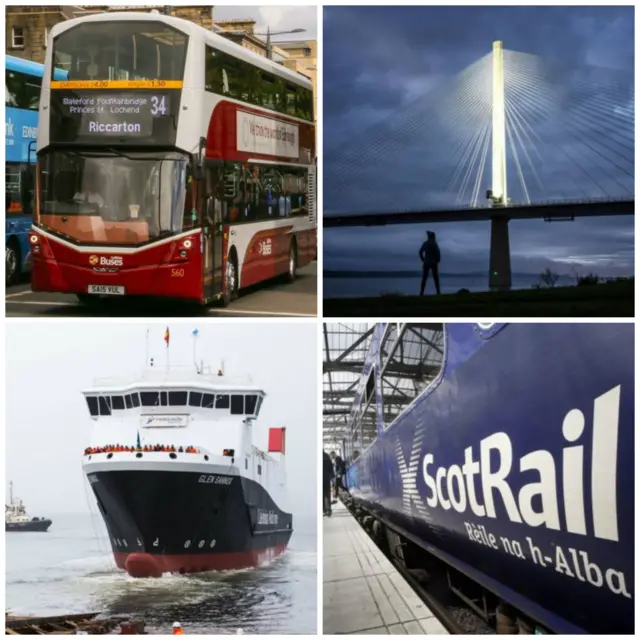 Image source, bbc/PA/Getty Images
Image source, bbc/PA/Getty ImagesMSPs will now quiz transport, infrastructure and connectivity ministers.
First Minister Nicola Sturgeon MSP answers questions from the Scottish Parliament's committee conveners
Transport and justice ministers face portfolio questions
MSPs debate artificial intelligence and data driven tech
An SNP MSP leads a debate on pancreatic cancer
Craig Hutchison and Louise Wilson
 Image source, bbc/PA/Getty Images
Image source, bbc/PA/Getty ImagesMSPs will now quiz transport, infrastructure and connectivity ministers.
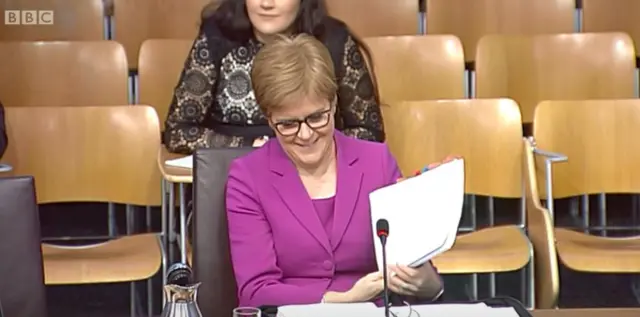 Image source, bbc
Image source, bbcThat concludes committee conveners questioning the first minister.
Here's what we're covering shortly in the chamber:
2:00pm: Portfolio Questions: Transport, Infrastructure and Connectivity; Justice and the Law Officers
2:40-5:00pm: Scottish government debate: Artificial Intelligence and Data Driven Technologies: Opportunities for the Scottish Economy and Society
5:05pm: Members' Business: Clare Adamson: Pancreatic Cancer Awareness
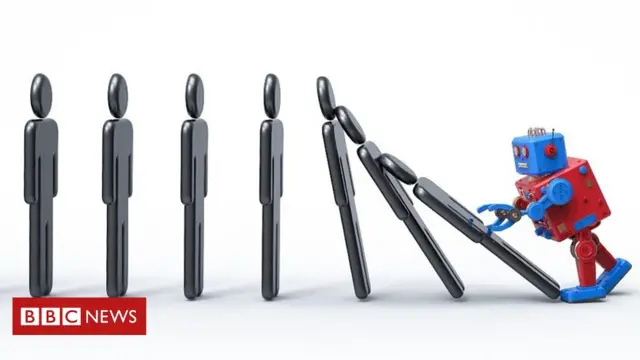 Image source, bbc
Image source, bbcIs AI a threat to humanity or an opportunity?
Europe and external affairs committee convener Joan McAlpine asks about no-deal preparations, the re-purposing of the old port in Stranraer and an increased risk of smuggling and organised crime.
Earlier this year we reported that Stena Line had said it hopes to conclude negotiations "very soon" which could allow its old port at Stranraer to be used as a lorry park.
The first minister replies there certainly would be an increased risk and these issues are under very close discussion with the police.
No-deal planning is paused but will be reactivated very quickly if we head back in that direction, she adds.
The first minster says she has an acute concern about the economic impact on Scotland of Northern Ireland effectively being in the customs union and single market.
Justice Committee convener Margaret Mitchell says adequate funding for voluntary organisations in community justice is vital but often local authorities have a vested interested in retaining services in house.
She urges the first minister to address this "blatant unfairness" in the next budget, arguing the third sector is often more experienced with such matters.
We will consider that point, says the first minister.
She accepts very often the third sector is better placed and more innovative but says she cannot dictate how councils spend their budgets and often there is pushback is funding is redirected.
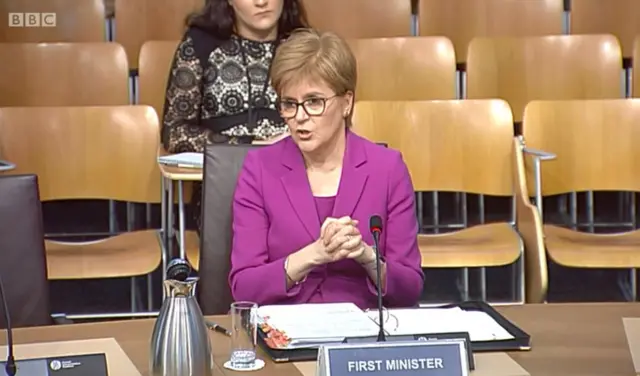 Image source, bbc
Image source, bbcClimate change committee convener Gillian Martin says the Climate Change (Scotland) Act has passed and the Scottish government must now produce a plan by April.
The committee convener says the UK government's Environment Bill has fallen due to the general election and asks how that impacts the Scottish government's plans.
The first minister explains delays in UK environment bills d not help the Scottish government.
Neither does the lack of certainty for renewable technology, adds Ms Sturgeon.
Ms Maguire asks if the first minister is content with progress on the race equality action plan.
Ms Sturgeon says in the two years since it was published some progress has been made but there is still more to do.
The convener highlights calls to recognise racism beyond the legal definitions in the Equality Act, particularly on differences between racism which is colour-based and that which impacts white migrant groups.
The first minister says this is an important issue and racism must be understood in both historical and current contexts.
We must ensure our actions reflect the complexity of the issue, she adds.
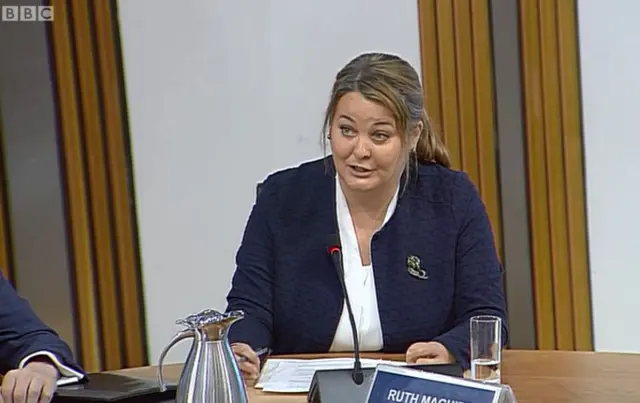 Image source, bbc
Image source, bbcEquality and Human Rights Committee convener Ruth Maguire
Equality and Human Rights Committee convener Ruth Maguire begins saying Makar Jackie Kay has said that Scotland had to grow up about racism.
Ms Maguire says there is a lack of BME representation in our parliament, with BME groups still experiencing inequalities in all areas.
She asks for an acknowledgement racism exists in Scotland and its structures.
The first minister believes racism does exist in Scotland and the government is trying to tackle this.
Ms Sturgeon adds: "There is still a mountain of work to do."
"Now is a time when we have to look at ourselves really hard in the mirror."
Mr Mountain asks if the government is still confident R100 will be delivered by 2021.
The Reaching 100% (R100) is aiming to provide access to superfast broadband to 100% of premises in Scotland by 2021.
Nicola Sturgeon says the intention is to have the north contract signed in this calendar year and it will be then that the timetables for delivery are set out.
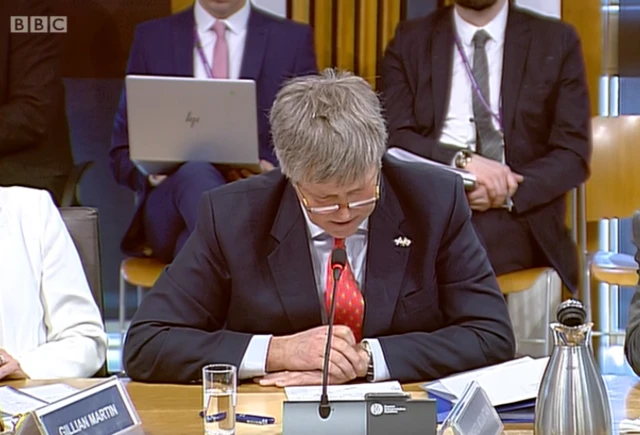
Rural Economy and Connectivity Committee convener Edward Mountain
Convener Edward Mountain says the Rural Economy and Connectivity Committee is looking forward to the Good Food Nation Bill and seeks a guarantee it will also cover procurement of local foods for schools, hospitals and prisons.
The first minister confirms the government will bring forward the bill in this parliament session and accepts the health and economic benefits locally procured produce can bring.
Mr Mountain raises management of inshore fisheries and preventing illegal dredging.
Ms Sturgeon says the government did preparatory work for an inshore fisheries bill in 2016 but Brexit caused so much uncertainty that it did not make sense to continue it.
We have taken non-legislative action to improve management of inshore fisheries she insists.
Local Government and Communities convener James Dornan pivots to the Domestic Abuse (Scotland) Act 2018 and asks about what provision there is to protect women from financial coercion.
Ms Sturgeon says the whole thrust of the act is to address behaviour like this that is designed to make someone dependent on their partner or ex-partner.
The first minister adds the Act will allow controlling or restricting access to money to be addressed.
There have been 13 convictions under the new law, she adds.
The Domestic Abuse Bill, external was passed last year and criminalises psychological domestic abuse.
Mr Dornan urges the government to work with his committee and other stakeholders to change attitudes towards financial abuse and coercion.
The new law is important as it rectifies a clear deficiency, but the deeper and more fundamental job is culture change, replies Ms Sturgeon, and she agrees to working together to take this forward.
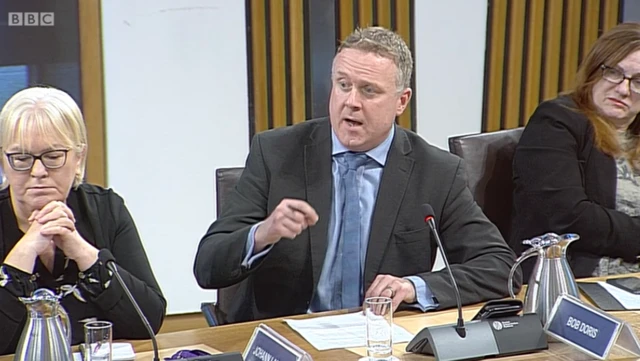
Social Security Committee convener Bob Doris notes the recently published benefits uptake strategy and highlights his committee is currently holding in inquiry on uptake.
Is the Scottish government confident it can provide the resources to meet demand, he asks.
These are demand-led budgets so we are taking decisions to support whatever the demand is, replies the first minister.
We are basing this on forecasts, she adds.
Mr Doris highlights suggests the UK government may expect the Scottish government to "pick up the bill" if uptake of reserved benefits goes up due to Scottish government efforts.
Ms Sturgeon says this is a concern relating to the operation of the fiscal framework but she insists the costs of any increase in uptake must fall to the government responsible for that benefit.
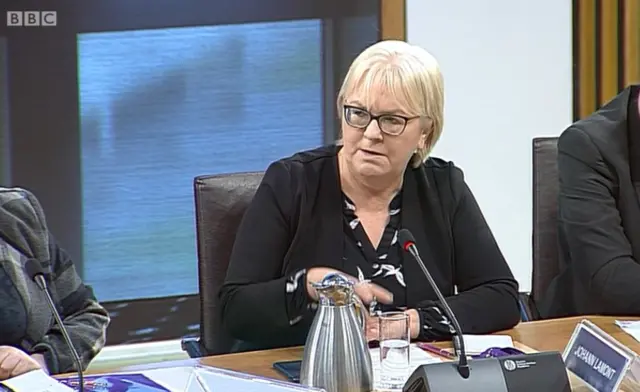 Image source, bbc
Image source, bbcPublic Petitions Committee convener Johann Lamont
Public Petitions Committee convener Johann Lamont asks about the issues on two petitions around the A75 and A77.
The first minister replies she does not have the detail around those petitions, although she accepts the importance of them.
Ms Lamont calls for a speeding up of the process of responding to petitions and lambastes the state of the roads.
The first minister says there is a balance to be struck between being definitive and looking at the evidence the committee hears.
She explains all petitions are dealt with on a cross government basis.
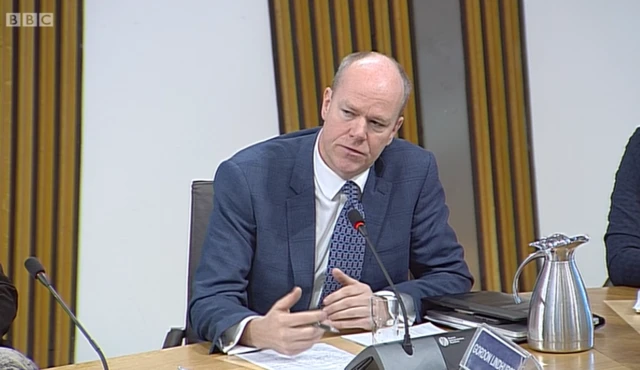
Economy, Energy and Fair Work Committee convener Gordon Lindhurst
Economy, Energy and Fair Work Committee convener Gordon Lindhurst asks about the Scottish Growth Scheme.
The first minister says it is due to run for three years but the government will consider whether it will be extended and whether further funding will be put towards it.
The latest figures found £160m had been invested into 262 companies, including private resources of £115m leverages by public funding.
Mr Lindhurst asks how the Scottish National Investment Bank will meet its goals.
Ms Sturgeon says £2bn will be invested over the next decade, which will be measured against whether they support the missions and get appropriate returns.
Ms Mitchell moves on to preventative spend and says the Scottish Prison Service has made an operational decision to focus its budget on immediate need.
This has led to the closure of the throughcare scheme, adds the Justice Committee convener.
She asks if this risks more recidivism and calls for a three year funding cycle for the voluntary sector.
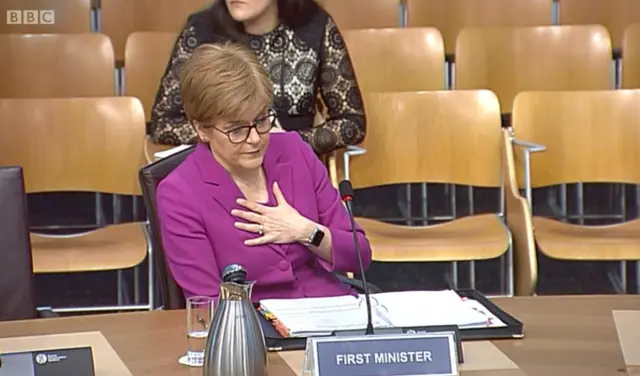 Image source, bbc
Image source, bbcFirst Minister Nicola Sturgeon
The first minister replies there is always a tension between preventative spend and immediate need.
She agrees there is a very strong case for three year funding but points out the Scottish government is struggling to give one year certainty due to the position it is in due to the UK government.
Deputy Presiding Officer Christine Grahame does not allow Ms Sturgeon to refer to Ms Mitchell's party as she says she is asking the questions as the Justice Committee convener.
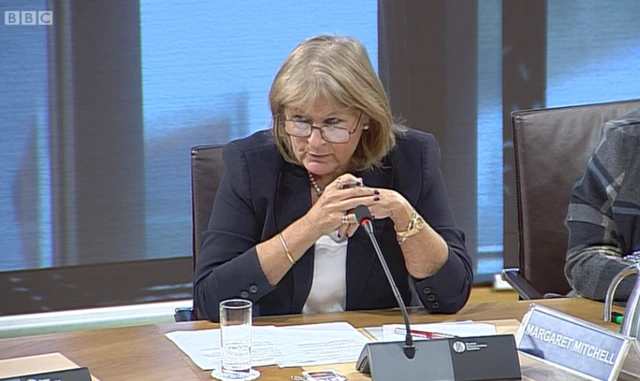
Justice Committee convener Margaret Mitchell
Justice Committee convener Margaret Mitchell says the current prison population is only 220 people short of being at the emergency limit and she specifically highlights problems at HMP Barlinnie.
The use of remand instead of community alternatives is a significant element of this, she adds.
Ms Sturgeon says she is "very concerned" about the prison population and confirms it is under weekly scrutiny by the cabinet.
There are a range of long-term reforms the government is pursuing, says the first minister.
She criticises the Scottish Tories' proposals on sentencing reform, labelling them "wrong-headed" and suggesting they would in fact increase prison population by about 40%.
Investment in the prison estate is also highlighted.
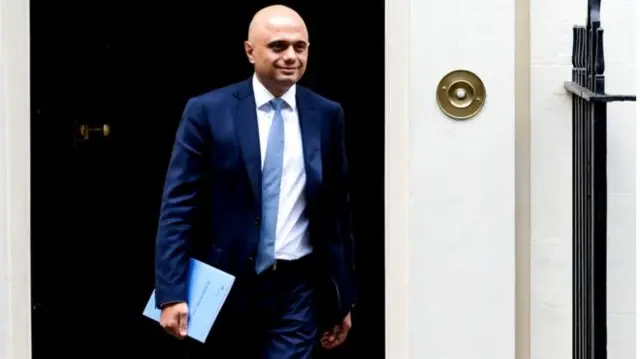 Image source, Getty Images
Image source, Getty ImagesChancellor Sajid Javid
Thanks to the Westminster election, the Holyrood budget process faces a tight timetable in the new year.
MSPs will have only a few weeks to scrutinise the Budget Bill.
That means SNP ministers have limited time to secure support from opposition MSPs to get the budget passed.
Wednesday should have been Budget day at Westminster, but plans for Chancellor Sajid Javid to set out the first post-Brexit Budget were pulled when Brexit had to be postponed.
Finance and Constitution Committee convener Bruce Crawford notes the UK budget will not be published until early 2020 and the Scottish government will have to respond very quickly in terms of setting spending and income tax plans.
He wonders how the government is preparing for this challenge and how it is supporting councils and public bodies.
"This is really, really difficult," replies the first minister.
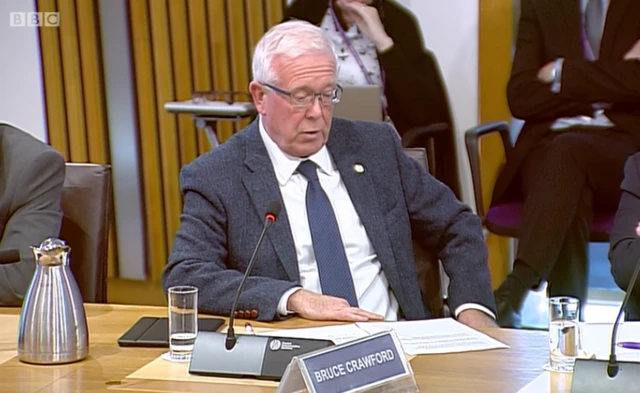
Finance and Constitution Committee convener Bruce Crawford
She says the government feels "intense frustration" about the situation as it means they do not have an idea of how much money Scotland will have.
We are trying to plan as much as we can but we are "completely in the dark" at the moment, she adds.
We have no idea when a new UK government is likely to do a budget, Ms Sturgeon says.
Mr Crawford asks about contact with the Treasury about concerns around the delayed budget..
The first minister replies Derek Mackay has written to the Treasury expressing very strong concerns.
Allow X content?
This article contains content provided by X. We ask for your permission before anything is loaded, as they may be using cookies and other technologies. You may want to read X’s cookie policy, external and privacy policy, external before accepting. To view this content choose ‘accept and continue’.
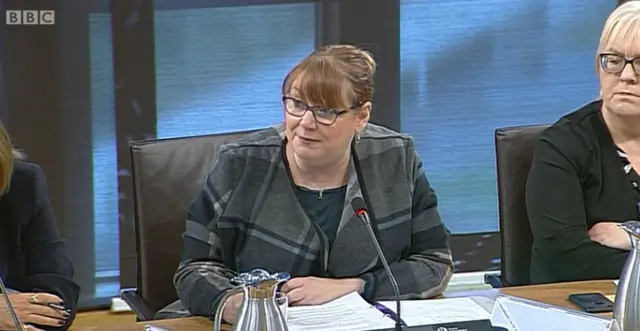 Image source, bbc
Image source, bbcEducation Committee convener Clare Adamson
Education and Skills Committee convener Clare Adamson asks about the three year temporary leave to remain scheme announced by the UK government.
EU nationals arriving in the UK before the end of next year will be able to apply to stay for three years in the event of a no-deal Brexit.
The first minister replies the Scottish government has been trying very hard to find clarity around this with varying degrees of success.
Ms Sturgeon points out the three year temporary leave to remain scheme does not suit Scotland's four year degrees.
She stresses the benefits of the Erasmus scheme.
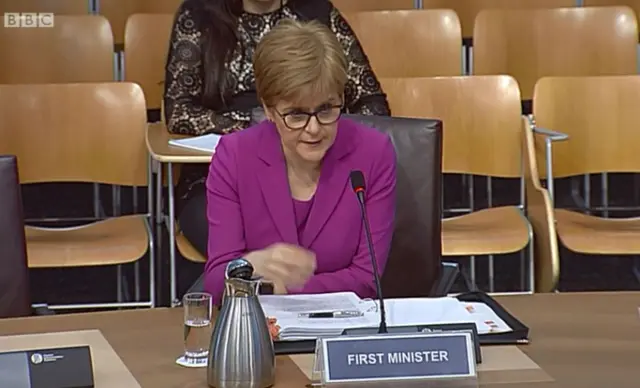 Image source, bbc
Image source, bbcMs McAlpine asks whether there has been any assessment of what the updated no-deal tariff schedule means for key sectors, including agriculture.
Ms Sturgeon agrees the impact on agriculture could be severe.
She highlights support for a temporary tariff regime to avoid compounding EU tariffs and cheaper imports.
But the UK government has not so far been open to this option, she adds.